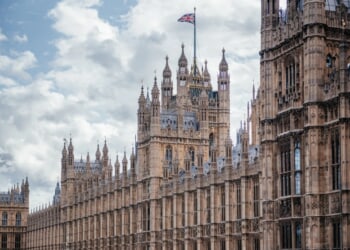WASHINGTON — “Don’t be a PANICAN,” President Donald Trump cautioned on social media. Critics have questioned the universal tariffs he unleashed last week, and Americans have had to steel themselves before checking the balance of their 401(k)s.
The Trump tariffs came fast and larger than expected. The markets responded.
Now Republicans and Wall Street big shots find themselves defending an economic approach that was anathema to them not long ago. But the world has changed.
“Their export-based economy is, I think, beginning to hit the end of its course,” Chuck DeVore of the conservative Texas Public Policy Foundation opined over the phone Monday.
After years of manufacturers quitting the USA, tariffs could be good for national security.
My favorite sound bite in favor of Trump’s tariffs came from Commerce Secretary Howard Lutnick on “Face the Nation” Sunday. “We don’t make medicine in this country anymore. We don’t make ships,” he said. “We don’t have enough steel and aluminum to fight a battle, right?” (RELATED: Tariffs: The Sword of Sovereignty)
Lutnick’s right, and the beneficiaries have been college-educated voters like me, as the offshoring of manufacturing offered cheaper goods, but also fewer jobs for non-college graduates — who, coincidentally, voted for Trump. (RELATED: The Tariff Reckoning: America’s Economic Resolve in Trump’s Second Act)
Trump is the rare U.S. politician who wants to do something about the working class.
Wall Street is coming to the same table.
JPMorganChase CEO Jamie Dimon is a hardcore capitalist. But in his annual shareholder letter, Dimon acknowledged the downside of tariffs when he wrote, “Whether or not the menu of tariffs causes a recession remains in question, but it will slow down growth.”
Even still, on CNBC, Dimon remarked, “If it’s a little inflationary, but it’s good for national security, so be it. I mean, get over it.”
“You’ve got Wall Street caterwauling and wanting the government to back off,” DeVore told me. But: “The president is serious about applying what he sees as medicine to this economy.”
Trump used the same term on Air Force One on Sunday when he said, “Sometimes you have to take medicine to fix something.”
Confession time: I’m not a huge fan of tariffs.
On the one hand, they’re a tax hike that is spooking the markets and costing some people their jobs. Last week, Stellantis laid off 900 U.S. workers as the automaker assesses the impact of Trump’s move.
On the other hand, Trump campaigned by telling voters he would raise tariffs, and he won the election.
The elephant in this room is China.
“The Chinese believe that the United States are a great power in inevitable decline,” Secretary of State Marco Rubio argued during his confirmation hearing, “and that they are in inevitable rise.” (RELATED: US Tariffs: China in the Crosshairs)
DeVore warned, “The last thing you want to do at this point is show weakness.”
READ MORE from Debra J. Saunders:
After the 2024 Presidential Campaign, the Books
Trump Plays Cat to Canada’s Mouse
Contact Review-Journal Washington columnist Debra J. Saunders at dsaunders@reviewjournal.com. Follow @debrajsaunders on X. COPYRIGHT 2025 CREATORS.COM
And now, Wall Street titans begin to acknowledge that tariffs may have a role beyond the stock market.




![Jasmine Crockett Justifies Mass Illegal Immigration With Bizarre Argument [WATCH]](https://www.right2024.com/wp-content/uploads/2025/03/1742007023_Jasmine-Crockett-Justifies-Mass-Illegal-Immigration-With-Bizarre-Argument-WATCH-350x250.jpg)


![NYC Tourist Helicopter Falls into Hudson River, Siemens Executive and Family Among Those Killed [WATCH]](https://www.right2024.com/wp-content/uploads/2025/04/NYC-Tourist-Helicopter-Falls-into-Hudson-River-Siemens-Executive-and-350x250.jpg)









